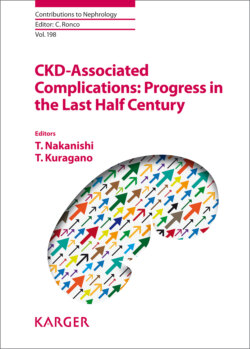Читать книгу CKD-Associated Complications: Progress in the Last Half Century - Группа авторов - Страница 33
На сайте Литреса книга снята с продажи.
Nutritional Management
ОглавлениеAchieving adequate protein and energy intake are the two key components of nutritional management in dialysis patients. In terms of protein intake, many studies have demonstrated that a higher normalized protein catabolic rate (nPCR), which is an index of protein intake in steady state patients, is associated with better survival. A study investigating nPCR at the time of initiation of dialysis revealed that changes in nPCR during the first 6 months were positively associated with higher serum albumin subsequently and improved 5-year survival [16]. Moreover, we previously demonstrated that changes in nPCR for 4 months were positively and significantly associated with changes in creatinine generation rate, which is an index of muscle mass in the body [17]. These findings reinforce the hypothesis that protein intake might enhance the nutritional status and prevent wasting conditions in dialysis patients.
In terms of the second key component of nutritional management, energy intake, a 1989 study investigated the effect of energy intake on nitrogen balance and body weight changes in hemodialysis patients who consumed a sufficient amount of dietary protein, namely, 1.1–1.2 g/kg/day. They found that a higher energy intake, or 45 kcal/kg/day, was associated with a positive nitrogen balance and an increase in body weight within 3 weeks. In contrast, a lower energy intake, or 25 kcal/kg/day, was associated with a negative nitrogen balance and a reduction in body weight [18].
In the context of these findings, an important challenge is that older dialysis patients often experience a reduced appetite, which can jeopardize sufficient nutrient intake. A study investigating voluntary dietary intake of protein and energy found that an intra-dialytic parenteral nutrition (IDPN) regimen containing 16 kcal/kg/session of lipid and amino acids corresponding to 0.08 g/kg/session of nitrogen enhanced the voluntary protein and energy intake from daily food [19]. Another study demonstrated that essential amino acids containing branched amino acids improved dietary protein and energy intake in hemodialysis patients [20]. These results indicate that proper nutritional management can enhance dietary intake and improve nutritional status, getting patients started on a favorable cycle.
Nutritional intervention during dialysis sessions has become popular. Patients who receive oral nutritional support (ONS) during dialysis sessions have an almost 30% lower risk of death, especially those with lower serum albumin levels [21]. A recent study in which patients were given either a protein- and energy-rich diet or a low-protein diet during dialysis sessions showed that those on the protein-rich diet exhibited an increase in serum albumin for only 8 weeks [22]. International Society of Renal Nutrition and Metabolism guidelines on food intake during hemodialysis sessions describe the advantages and disadvantages of food intake during sessions and recommend dietary intake if it can be tolerated by the patient [23].
On the other hand, there are still concerns about food intake during hemodialysis, such as hypotension, vomiting, aspiration, and asphyxiation. Patients with malnutrition-wasting conditions often experience these complications. Moreover, the loss of appetite often seen in older dialysis patients can prevent them from eating during dialysis therapy. IDPN can be of help in such patients. Even though IDPN did not exhibit the add-on effect seen with ONS in randomized controlled trials performed in patients with malnutrition-wasting conditions [24] and some of the nutrients provided through IDPN can be eliminated during the dialysis process, the intervention can improve nutritional status in those patients who are not eligible for dietary intervention or cannot eat enough food [19]. As such, the European Society of Parenteral and Enteral Nutrition guidelines for kidney disease patients recommend IDPN for patients who have insufficient dietary intake and who are not adherent to ONS [25]. Therefore, IPDN itself is an option for nutritional therapy.
Eating is an important aspect of QOL because appetite is one of the most fundamental human desires. Furthermore, food or taste preferences should be taken into consideration in dietary therapy as they can affect adherence. A multidisciplinary approach is indispensable to maximize the efficacy of nutritional therapy.
